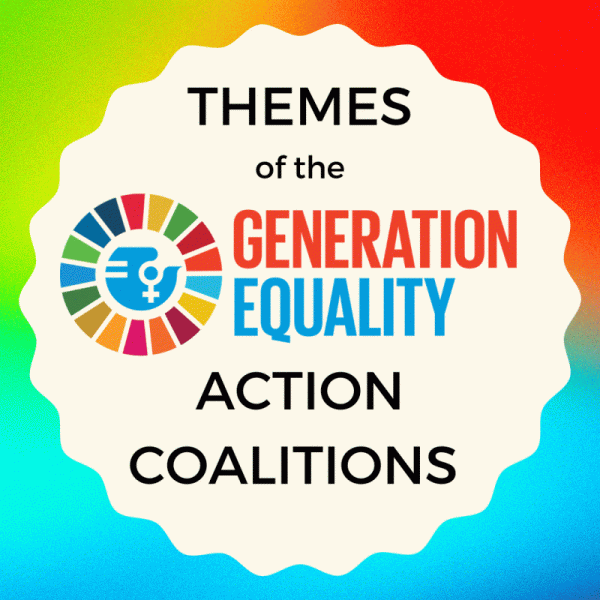Grassroots Women to lead two Generation Equality Forum Action Coalitions as part of the Beijing Platform for Action 25th Anniversary Commemoration

We have come a long way from claiming space and recognition in the 4th World Conference on Women in 1995, to securing formal recognition of their leadership in the women’s movement 25 years later. Grassroots women will take lead in two Action Coalitions of the Generation Equality Forum as part of a global organizing effort to commemorate the 25th Anniversary of the Beijing Platform for Action. The forum will be convened by UN Women and co-hosted by the governments of Mexico and France in the first half of 2021. Violet Shivutse, Huairou Chair, was appointed to the Multi-Stakeholder Steering Committee, overseeing the entire organizing process leading up to the Forum.
We see this as an opportunity to synergize with the feminist movement, ensuring that grassroots women’s priorities are included and to lead the change conversations. The Huairou Commissions’ leaders will participate in the pillars on Economic Rights and Justice and in Gender Based Violence through the Global Coalition on Safer Cities and Public Spaces for Women and Girls.
Huairou Commissions’ leaders will participate in the pillars on Economic Rights and Justice and in Gender Based Violence through the Global Safer Cities Coalition. The latter is led by Lana Finikin, Huairou Governing Council Vice-Chair, alongside Maite Rodriguez, coordinator of the Red Mujer y Habitat network, Kathryn Travers from Women in Cities International, Suneeta Dhar from Jagori and Kalpana Viswanath from Safetipin. Magdalena Garcia Hernandez, a Governing Council member, is representing the Huairou Commission and working with the network members to participate in the Economic Rights and Justice Pillar of the Action Coalition. Meanwhile, Sandy Schilen, as the Executive Director, will be supporting the HC member groups’ leaders in steering the strategy for engagement.
As part of our economic justice pillar leadership, we commit to:
- strengthen and promote the resourcing of economic empowerment initiatives that improve the working conditions and livelihoods of grassroots women;
- recognize and valorize grassroots women’s caregiving roles in families and communities so as to compensate women in rural and urban poor and working class communities by providing income and social protection supports that enumerate and reward the skills, labor, time and social capital created by women;
- scale existing efforts to secure women’s access to and control over land and property and ensure women receive public support to undertake economic activities that make productive and sustainable use of these assets;
- lead public media campaigns highlighting the efforts and impacts of grassroots women’s work and challenging stereotypes that “women aren’t farmers”, “caregiving work is ‘voluntary’, minimal and unskilled” and, overall, “women’s work is simply too casual to be formally supported by government and private sector”.
The Economic justice pillar co-leads are the German, Mexican, South Africa, Spanish, and Swedish governments alongside OECD, UN Capital Development Fund and Melinda and Bill Gates Foundation.
For the Gender Based Violence pillar, which will be co-led by the Icelandic, Kenyan, British, and Uruguayan governments alongside European Commission, WHO, UN Women and Ford Foundation, the Global Coalition on Safer Cities and Public Spaces for Women and Girls will prioritize:
- securing commitments from key stakeholders including governments, private sector, donors, development banks and others of concrete actions;
- developing an online tracking system on data generated all over the world, and actions by stakeholders;
- creating a learning-sharing platform – using innovation, technology and big data;
- bringing together communities of young women especially from grassroots organisations in poor and marginalized areas who have demonstrated leadership and led a transformative change process;
- convening diverse stakeholders to develop milestones and actionable agendas.
We look forward to harmonizing the grassroots women’s agenda with the wider feminist movement and the UN Women, uncovering and fostering positive synergies. At the same time we are negotiating space and modes of organizing with the UN Women across the Action Coalitions as to preserve the bottom up spirit that we nurture in our grassroots women’s movement.
Learn more about the Action Coalitions: https://forum.generationequality.org/
